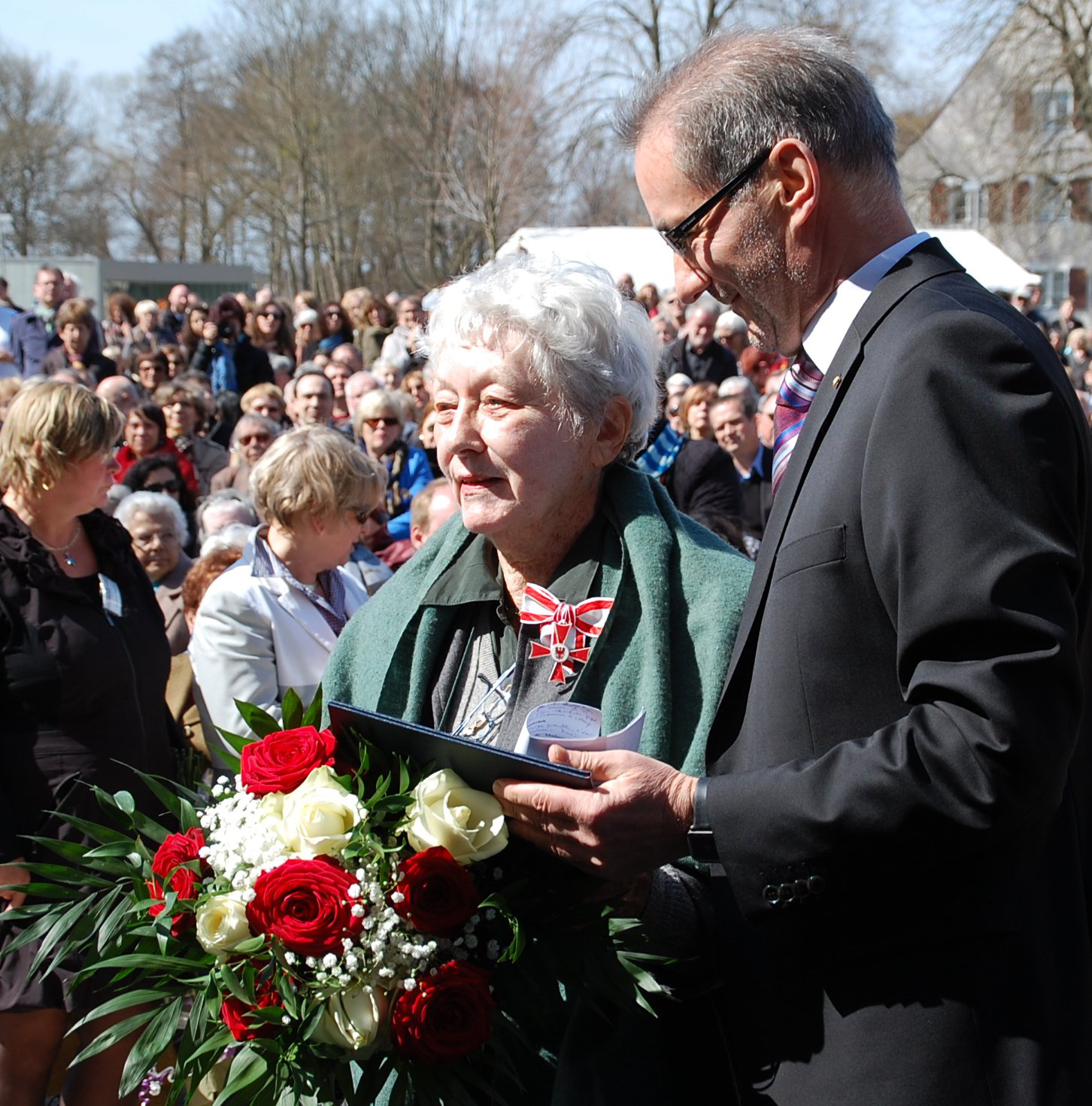Dr. Annette Chalut, née James-Weill
born on April 29, 1924 in Paris
deceased on November 8, 2021 in Paris
doctor
Ravensbrück: May 18, 1944, June 1944 Hanover-Limmer (Ravensbrück satellite camp) - April 15, liberation in Bergen-Belsen by British troops
She received numerous awards, including the medal of a commander of the French Legion of Honor and the Order of Merit of the State of Brandenburg.
Dr. Annette Chalut 2013, awarded the Brandenburg Order of Merit

Dr. Annette Chalut 2013, Verleihung des Brandenburgischen Verdienstordens
Annette James-Weill was born on April 29, 1924 in Paris, the second of three sisters. She comes from a very patriotic French family of Jewish origin. She got a first impression of the changes in Germany under National Socialism in the thirties as a schoolgirl: there were more and more immigrants in schools who had to leave Germany because of anti-Semitism, xenophobia and persecution. After graduating from high school, she began studying medicine in Paris. After the occupation of France by the German Wehrmacht, persecutions for racist reasons began very quickly. On December 12, 1941, her father was arrested for the first time during the mass arrests of municipal employees of Jewish origin and interned in the notorious Compiègne-Royalieu camp. Thanks to his wife's intervention, he was released in March 1942. After his release in April 1942, the family moved to the "zone libre" (free zone), which was not yet occupied by the Germans, and organized new identification papers with the code name "Warnod".
Annette continued her medical studies in Toulouse. Her father joined the resistance movement, the Résistance. Annette and her older sister helped him to free as many prisoners as possible from the internment camps in southern France in order to save them from deportation. They procured new identity papers with a false identity, organized escape routes to Spain or hid them in private accommodation. Due to a denunciation, they were arrested along with 60 other people on March 8, 1943, their mother and younger sister were hidden and escaped arrest. They survived. Annette was initially imprisoned for two months in the Saint-Michel prison in Toulouse, where she was subjected to interrogation. Since she was arrested under her alias, the Gestapo did not reveal her true identity. She was then imprisoned in Romainville, a fort in Paris that the Gestapo used as a security detention camp and point of departure for deportations. Coming from there, she finally arrived in Ravensbrück on May 18, 1944. Four weeks later she was deported to Hanover-Limmer, where she had to do forced labor in the gas mask production of Continentalgummi GmbH at a turntable and at the blast furnace. She was, as she herself put it, "bought by a factory to work for the armaments industry." Experienced April 15, 1945. At the time of the liberation, an extraordinary typhoid epidemic had just broken out. The freed prisoners were resettled in barracks, where Annette looked after her friends before she returned to Paris on May 30, 1945. Annette did not find out about her older sister's fate until 1945: Deported to Auschwitz via Drancy, she also survived and did not return to France until July 1945.
Her father was different - initially deported to Paris with Annette Chalut, he also came to Auschwitz and died there on October 3, 1944.
Since her return, she has been committed to the interests of the former deportees. After completing her medical degree, she worked as an occupational physician at the Center de Réforme, which was subordinate to the Ministry of Former Fighters. At the same time she took care of the medical care of her former comrades from the Resistance and the deportation period.
In 1948 she married a colleague, a doctor who had also fought in the Resistance and was deported to the Buchenwald concentration camp. She has three children with him.
Until 1990, Dr. med. Annette Chalut worked as a doctor. After she retired, she became an active member of the various associations of former resistance fighters and deportees.
Annette Chalut has been a member of the board of directors (Conseil d’administration) of the Association des anciennes déportées et internées de la Résistance (A.D.I.R.), which she has represented on the International Ravensbrück Committee (IKR) since 1992. After Rose Guérin's death in 1999, she became President of the International Ravensbrück-Committee